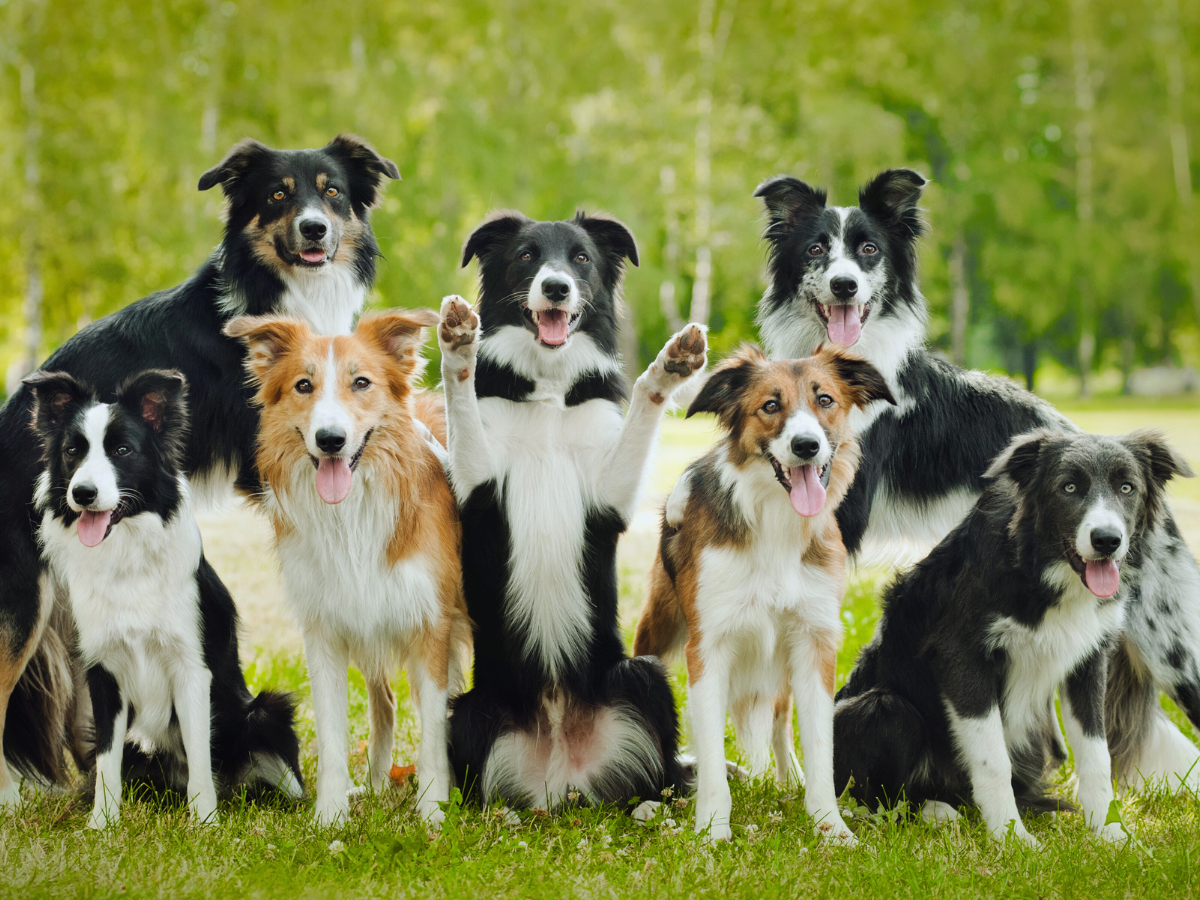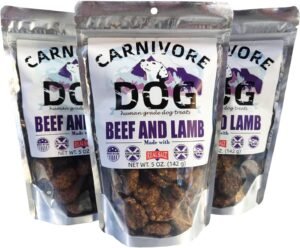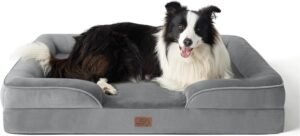
The carnivore diet offers several benefits for dogs, including improved coat condition, enhanced energy levels, and better digestion. By focusing on high-quality animal proteins, this diet can help maintain optimal health and support overall well-being in dogs, making it a popular choice among pet owners.
The carnivore diet has gained significant attention for its potential health benefits for humans, but it is also increasingly recognized as a beneficial dietary approach for our canine companions. This diet, which consists primarily of raw or cooked meat, bones, and animal organs, mirrors the natural diet of wild dogs and wolves. Let’s explore in this post the benefits of the carnivore diet for dogs, offering insights, practical advice for beginners, and expert opinions on why this diet can greatly enhance the health and longevity of dogs.
What is the Carnivore Diet for Dogs?
The carnivore diet for dogs is a dietary regimen that focuses exclusively on animal-based foods. It eliminates all plant-based ingredients, including grains, fruits, and vegetables. The primary components of this diet include:
- Raw or cooked muscle meat: Beef, chicken, lamb, pork, and other types of muscle meat.
- Organ meats: Liver, kidney, heart, and other nutrient-rich organs.
- Bones: Both raw and cooked bones provide calcium and other essential minerals.
- Fat: An essential energy source for dogs, found in various cuts of meat.
- Fish: Rich in omega-3 fatty acids, which are beneficial for skin and coat health.
The Benefits of the Carnivore Diet for Dogs
1. Improved Digestive Health
Dogs are naturally equipped to digest animal proteins and fats. Their short, acidic digestive tracts are designed to process raw meat efficiently. The carnivore diet aligns with this natural digestive physiology, often leading to improved digestion and nutrient absorption.
Dr. Karen Becker, a renowned integrative wellness veterinarian, states, “Feeding dogs a species-appropriate diet that mirrors what their wild ancestors ate can lead to significant improvements in digestive health, including reduced instances of diarrhea, constipation, and bloating.”
2. Enhanced Coat and Skin Health
A carnivore diet is rich in omega-3 and omega-6 fatty acids, which are essential for maintaining a healthy coat and skin. These nutrients help reduce inflammation, prevent dry skin, and promote a shiny, healthy coat.
Dr. Ian Billinghurst, a pioneer of raw feeding for pets, notes, “Dogs on a carnivore diet often exhibit a noticeable improvement in coat quality, with less shedding and reduced skin issues.”
3. Increased Energy Levels
Protein and fat are excellent energy sources for dogs. The carnivore diet provides a steady supply of these nutrients, which can lead to increased energy levels, better endurance, and overall vitality.
4. Stronger Immune System
Animal-based diets provide high levels of essential nutrients, such as vitamins A, D, E, and K, as well as minerals like zinc and selenium, which are crucial for a robust immune system. A carnivore diet helps fortify dogs’ natural defenses against illnesses and infections.
5. Healthier Weight Management
Obesity is a common problem among domestic dogs, often due to diets high in carbohydrates and fillers. The carnivore diet, being low in carbohydrates, helps dogs maintain a healthy weight by promoting muscle mass and reducing fat storage.
6. Reduced Allergies and Sensitivities
Many dogs develop allergies or sensitivities to grains and other plant-based ingredients found in commercial dog foods. By eliminating these potential allergens, the carnivore diet can help reduce or eliminate allergy symptoms such as itching, ear infections, and gastrointestinal issues.
7. Better Dental Health
Chewing on raw bones and tough meats helps keep dogs’ teeth clean by scraping away plaque and tartar. This natural dental hygiene method reduces the risk of periodontal disease, a common issue in dogs fed commercial kibble.
8. Improved Joint Health
The carnivore diet provides essential nutrients like glucosamine and chondroitin, which support joint health and can help alleviate symptoms of arthritis and other joint-related issues.
9. Enhanced Mental Health
Just as diet affects physical health, it also impacts mental well-being. A nutrient-rich carnivore diet can improve a dog’s mood, reduce anxiety, and promote better overall behavior.
10. Longer Lifespan
By addressing various health issues and promoting overall well-being, the carnivore diet can contribute to a longer, healthier life for dogs. Proper nutrition is a key factor in extending a dog’s lifespan and ensuring they enjoy a high quality of life in their later years.
How to Get Started with a Carnivore Diet for Dogs
1. Consult with a Veterinarian
Before making any significant changes to your dog’s diet, it’s important to consult with a veterinarian, preferably one experienced with raw feeding or species-appropriate diets. They can provide personalized guidance based on your dog’s specific health needs and conditions.
2. Transition Gradually
Transitioning to a carnivore diet should be done gradually to avoid digestive upset. Start by mixing small amounts of raw or cooked meat into your dog’s current diet, gradually increasing the proportion over a few weeks.
3. Focus on Variety
To ensure your dog receives a balanced diet, offer a variety of meats and organ foods. This variety helps provide a broad spectrum of nutrients necessary for optimal health.
4. Include Raw Bones
Incorporate raw bones into your dog’s diet to promote dental health and provide essential minerals. Always supervise your dog while they’re chewing bones to prevent choking or other issues.
5. Monitor Health and Adjust as Needed
Keep a close eye on your dog’s health and behavior during the transition. Monitor their weight, coat condition, energy levels, and overall well-being. Adjust the diet as needed based on these observations and your veterinarian’s advice.
Specific Recommendations for Beginners
- Start with Lean Meats: Begin with easily digestible meats like chicken or turkey. These are generally well-tolerated by most dogs.
- Gradually Introduce Organ Meats: Organs are nutrient-dense but can cause digestive upset if introduced too quickly. Start with small amounts and gradually increase the portion.
- Offer Bone Broth: Bone broth is an excellent way to introduce the benefits of bones without the risk of choking. It’s also highly nutritious and can help with hydration.
- Avoid Processed Foods: Stick to whole, unprocessed meats and organs. Avoid any additives or preservatives that can be harmful to your dog.
- Stay Hydrated: Ensure your dog has constant access to fresh water, especially when transitioning to a higher-protein diet.
Disadvantages of the Carnivore Diet for Dogs
While the carnivore diet offers numerous benefits, there are potential drawbacks to consider:
- Nutrient Deficiencies: Without careful planning, the diet can lack certain nutrients like calcium, vitamin E, and manganese. It’s essential to provide a balanced variety of animal products.
- Cost: High-quality meats and organs can be expensive, making the diet more costly than commercial dog food.
- Time and Effort: Preparing a balanced carnivore diet requires time and effort, which may not be feasible for all pet owners.
- Risk of Bacterial Contamination: Handling raw meat carries the risk of bacterial contamination, both for dogs and their owners. Proper handling and hygiene practices are crucial.
Expert Opinions
Dr. Richard Patton, an animal nutritionist with over 40 years of experience, states, “A carnivore diet when properly balanced, can provide all the essential nutrients that dogs need for optimal health. It aligns with their natural dietary needs and can lead to significant improvements in overall well-being.”
Dr. Judy Morgan, a holistic veterinarian, adds, “Many of my canine patients have thrived on a carnivore diet. The reduction in inflammatory foods and the high nutrient density of animal products can lead to dramatic improvements in health, particularly for dogs with chronic conditions.”
Real-Life Success Stories
- Luna, a 5-year-old Labrador Retriever: Luna suffered from chronic skin allergies and frequent ear infections. After switching to a carnivore diet, her skin cleared up, and the ear infections became a thing of the past. Her coat is now shiny, and she has more energy than ever.
- Max, a 7-year-old German Shepherd: Max had digestive issues and struggled with obesity. The carnivore diet helped him shed excess weight, and his digestion improved significantly. Max is now more active and happier.
The carnivore diet offers numerous benefits for dogs, including improved digestive health, enhanced coat and skin quality, increased energy levels, and a stronger immune system. By aligning with their natural dietary needs, this diet can help dogs achieve optimal health and longevity.
For pet owners considering the carnivore diet for their dogs, it’s important to consult with a veterinarian, transition gradually, and ensure a variety of nutrient-dense foods. While there are potential drawbacks, the benefits often outweigh the disadvantages, making the carnivore diet a compelling choice for many dog owners.
Providing a species-appropriate diet for your dog can lead to remarkable improvements in their health and quality of life. The carnivore diet, with its focus on high-quality animal products, offers a natural and effective way to nourish your dog and support their well-being. By following the guidelines and recommendations outlined in this article, you can embark on a journey toward better health for your beloved canine companion.
Daddy’s Choice

Human-Grade Quality: Carnivore Dog Treats are crafted to meet the same standards as human food, ensuring your pet enjoys treats that are as wholesome as what you’d eat.
Expert Quotes
Dr. Jean Dodds, a leading veterinarian and researcher, says, “Feeding dogs a diet that aligns with their evolutionary needs can lead to significant health benefits. The carnivore diet, rich in high-quality proteins and fats, supports overall wellness and vitality.”
Dr. Barbara Royal, an integrative veterinarian, states, “I’ve seen many dogs transform on a carnivore diet. The reduction in inflammation and the boost in essential nutrients can make a world of difference, particularly for dogs with chronic health issues.”
Embrace the Carnivore Diet for Your Dog
If you’re ready to take the leap and switch your dog to a carnivore diet, start today. By following the guidelines and expert advice provided in this article, you can ensure a smooth transition and provide your dog with the best possible nutrition. Remember, your dog’s health and happiness are worth the effort, and the carnivore diet can be a powerful tool in achieving that goal.
By prioritizing high-quality animal products, maintaining proper hygiene, and monitoring your dog’s health, you can help them thrive on a carnivore diet. Whether your goal is to address specific health issues or simply provide the best possible nutrition for your dog, the carnivore diet offers a promising path to improved health and longevity for your furry friend.
READ MORE
- The “Meat Monk” Routine: A Minimalistic, Monk-Style Daily Schedule Built Around Beef and Meditation
- Junk Food Jailbreak: Carnivore Keys to Freedom
- Pregnancy and the Carnivore Diet: Is It a Good Idea?
- When Is It Time to Stop Listening to Carnivore Influencers?
- Why the Carnivore Diet Differs From Location to Location: Why There Is No One-Size-Fits-All Rule
Exclusive Offer
